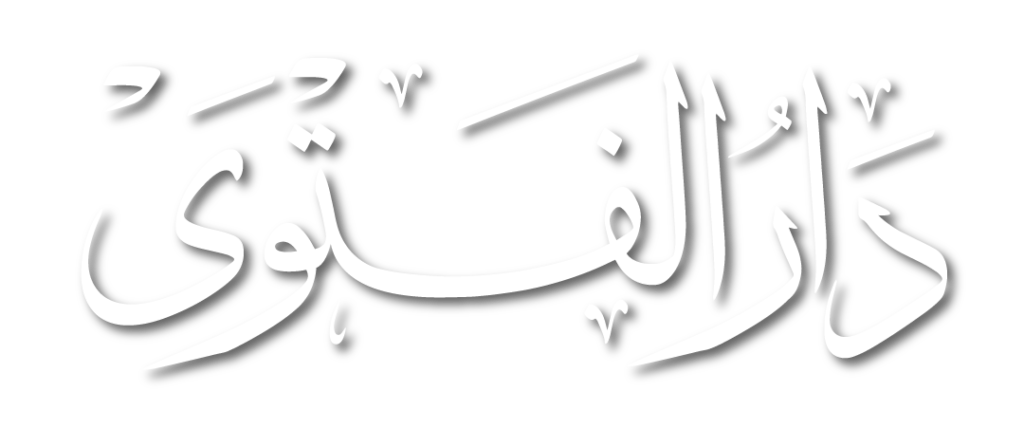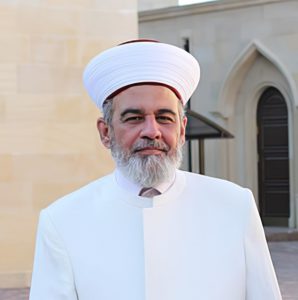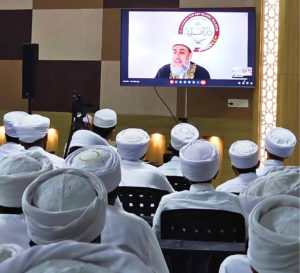There is consensus among the scholars that it is sunnah to visit the grave of the Prophet, sallallahu ^alayhi wa sallam, both for he who lives in al-Madinah and he who travels there for the express purpose of visiting the Prophet’s grave, and doing so is a great act of obedience.It is sunnah for the visitor to also have the intention to travel to pray in the mosque of the Prophet. Whoever travels to al-Madinah for this purpose should remember in his heart the great honor of the city of al-Madinah, and that it is the best city after Makkah. He should ask Allah to benefit him from this visit and to accept it as a worship from him. It is sunnah to perform the purificatory bath (ghusl) before entering al-Madinah and to wear one’s cleanest clothes.
Upon entering the mosque of the Prophet, one says:
I enter with the Name of Allah. Praise be to Him.
بسم الله والحمد لله
O Allah, raise the rank of Prophet Muhammad and his Al and protect his nation from that which he fears for them.
اللهم صلّ على محمد وعلى آله وسلّم
O Allah, forgive my sins.
اللهم اغفر لى ذنوبى
Open for me the Gates of Your Mercy (Guide me to the ways in which I may earn Your Mercy).
وافتح لى أبواب رحمتك
One enters the mosque with one’s right foot and exits with one’s left. One enters the mosque with the intention to go to the Rawdah (The area between the mimbar and the grave of the prophet, sallallahu ^alayhi wa sallam.) and pray Tahiyyatul-Masjid there next to the mimbar. Then, one moves to the grave of the Prophet and stands in front of it, about four (4) cubits away from it, facing it, with one’s back to the Qiblah. Standing there, one looks to the ground, without thinking about the worldly matters, having one’s heart full with love and respect for the Prophet, who is buried there. One says in a medium (normal) voice:
As-salamu ^alayka; O Messenger of Allah.
السلام عليك يا رسول الله
As-salamu ^alayka; O Prophet of Allah.
السلام عليك يا نبي الله
As-salamu ^alayka; O the Best among the Creations of Allah.
السلام عليك يا خِيرَةَ الله
As-salamu ^alayka; O Beloved One of Allah.
السلام عليك يا حبيب الله
As-salamu ^alayka; O the One chosen by Allah.
السلام عليك يا صَفْوَةَ الله
As-salamu ^alayka; O you, the Master of the Messengers and the Seal of the Prophets.
السلام عليك يا سيَّدَ المرسلين وخاتم النبيين
As-salamu ^alayka; O the Best of the entire creations.
السلام عليك يا خير الخلق أجمعين
As-salamu ^alayka; O Leader of those who are Ghurr and Muhajjalun (Ghurr and Muhajjalun refers to the Muslims who, when performing wudu’ wash beyond the required areas of the face, arms, and feet.).
السلام عليك يا قائد الغرّ المحجّلين
As-salamu ^alayka; and to your good and pure Al (your pious followers), your family, your wives, and your companions.
السلام عليك وعلى آلك وأهل بيتك وأزواجك وأصحابك الطيبين الطاهرين
As-salamu ^alayka; and to the rest of the prophets and messengers.
السلام عليك وعلى سائر الأنبياء والمرسلين
May Allah reward you for what you did for us with the best reward that He ever gave a prophet or messenger for what he did for his nation.
جزاك الله يا رسول الله عنّا أفضل ما جزى نبيا ورسولا عن أمته
May Allah raise your rank every time a person remembers to mention you and every time another forgets to do so, because his mind is occupied with other matters.
صلى الله عليك كلما ذكرك ذاكر وغفل عن ذكرك غافل
May Allah raise your rank in the best, most perfect, and greatest way Allah raised the rank of anyone among the entire creation.
أفضل وأكمل وأطيب ما صلّى على أحد من الخلق أجمعين
I bear witness that no one is God except Allah, without any partner with Him.
أشهد أن لا اله إلا الله وحده لا شريك له
I bear witness that you are the slave of Allah and His Messenger and the best among His creations.
واشهد أنك عبده ورسوله وخِيرته من خلقه
I bear witness that you conveyed the Message and you fulfilled the trust with which Allah ordered you. And you truly advised your nation for the good matters.
واشهد أنك قد بلغت الرسالة وأدَّيت الأمانة ونصحت الأمة
And you performed jihad in the best way.
وجاهدت فى الله حق جهاده
O Allah, give Prophet Muhammad a high status, and give him a great merit, and enable him to intercede for the people on the Day of Judgment as You promised him. Give him the ultimate (among the good things) of what a person may ask You.
اللهم وآته الوسيلة والفضيلة وابعثه مقاما محمودا الذى وعدته وأته نهاية ينبغي أن يسأله السائلون
O Allah, raise the rank of Prophet Muhammad, Your slave and Your Messenger; the Ummiy Prophet. May Allah raise the rank of his Al, his wives, and his descendants like Allah raised the rank of Ibrahim and the Al of Ibrahim. [O Allah, bless Muhammad, the Ummiyy (Ummiyy means the one who does not read or write) Prophet, his Al, wives, and descendants, like you blessed Ibrahim and the Al of Ibrahim.
You are the One Who deserves to be praised for all the endowments You give. You are the Great, the Glorified and the Praised One.
اللهم صل على محمد عبدك ورسولك النبي الأمي وعلى آل محمد وأزواجه وذريته كما باركت على إبراهيم وعلى آل إبراهيم فى العالمين إنك حميد مجيد
The one who does not to memorize all this du^a’, or does not have time to say all of it can merely say “As-salamu ^alayka, ya Rasul-Allah.”
السلام عليك يا رسول الله
One should not leave that place without at least saying this.
Then, one moves one cubit to the right to say salam to Abu Bakr, saying:
As-salamu ^alayka, O Abu Bakr, the one chosen by the Prophet, and the other person who was with him in the cave.
السلام عليك يا أبا بكر
صفي رسول الله وثانيه فى الغار
May Allah reward you with a high reward for what you did for the nation of the Prophet.
جزاك الله عن أمة نبيه صلى الله عليه وسلم خيراً
Then, one moves again to the right one cubit, and says salam to our Master ^Umar, saying: As-salamu ^alayka, O ^Umar, the one by whom Allah strengthened Islam.
السلام عليك يا عمر أعزّ الله بك الإسلام
May Allah reward you with a high reward for what you did for the nation of the Prophet.
جزاك الله عن أمة نبيه صلى الله عليه وسلم خيراً
Then, one returns to the place where one first stood in front of the grave of the Prophet and makes tawassul (To make tawassul means to ask Allah for good things by the Prophet, sallallahu ^alayhi wasallam) by the Prophet, asking Allah for what one wishes (by the status of) the Prophet. Then, one turns to face the Qiblah and makes du^a’ for oneself and for whomever one wishes. If a person had asked one to give his salams to the Prophet, let one say:
As-salamu ^alayka, O Messenger of Allah from (one names the person).
السلام عليك يا رسول الله من فلان
or (One names the person) gives his salam to you, O Messenger of Allah.
فلان يسلم عليك يا رسول الله





